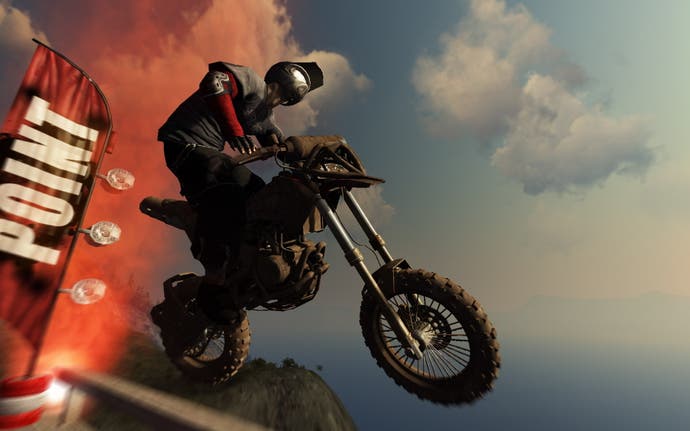FUEL
Pumped.
I always try and avoid falling back on such tired journalistic devices as claiming a game is "X meets Y", but in the narrow confines of the racing genre, where there can be barely a hair's breadth of distinction between different titles, I'm prepared to indulge in a little cliché. It's especially tempting to break out the comparisons when discussing FUEL, the latest racing franchise starter from Codemasters, home to such genre standards as TOCA, GRID and the Colin McRae Rally series.
It's an openworld racer, so parallels will inevitably be drawn with Burnout Paradise, which built on the groundwork of Test Drive Unlimited to free racers from the confines of menu-driven career modes. There are superficial similarities but, sitting with joypad in hand, the immediate reference point that springs to mind is 'MotorStorm meets Smuggler's Run'. FUEL certainly has the multi-class set-up and muddy aesthetic of Evolution's PS3 exclusive, but it's coupled with the freedom to roam offered by Rockstar's cult PS2 off-road scrambler.
"This is four years in the making," explains Ed Newby-Robson, the game's brand manager. "Asobo did a lot of work for THQ, with Ratatouille and Wall-E, and that's essentially been funding this project. It's a labour of love."
We're actually here to see Operation Flashpoint 2, but a last-minute addition to our itinerary means we get to hurry downstairs to have a little play with a very early pre-alpha build of FUEL as well. Even though the game is still deep in development, there's much to be impressed by, not least the absolutely vast map and the sheer number of things to do.
Newby-Robson reckons there's around 5,000 square miles of terrain, with 100,000 miles of tracks and trails across the map. All of this is rendered with a 40km draw distance, plus a full day-and-night cycle. The plan is to include over 70 vehicles in five different classes, with 70 career races and over 100 separate challenges outside of the career mode. New vehicles, liveries and outfits can be unlocked by finding and completing hidden challenges, and the idea is that racers will swap tips online to locate all the Easter eggs sprinkled throughout the sprawling environment.

"The setting of the game is post-climate change. The idea is that the sensible people have all gone away to the cities, and these are the crazy extreme racing guys," Newby-Robson says as he pulls up the in-game map on a plasma screen bigger than my house. "It's all based on satellite data and adapted for the game. Essentially, what we've done is take all the cool bits and got rid of the boring bits. You've Mount Rainier at the top, the salt flats on the top-right-hand side, Crate Lake in the centre and Yellowstone National Park somewhere around the top-left, and at bottom-right Monument Valley and the Grand Canyon. You've got a huge openworld environment to play in."
Victory in races earns you fuel, which is the de facto currency of this dystopian Mad Max world. Events take full advantage of the free-roaming map, with shortcuts not only tolerated but enthusiastically endorsed. As long as you hit the checkpoints, the game really doesn't care how you get there. The only thing stopping you is how much damage your vehicle can take, so if you want to try driving down a cliff to sneak into first place, you're free to take that risk. An optional GPS system adds a floating line of arrows in the air to show you the safest route to the next checkpoint, but victory in the long term will come from venturing away from the beaten path.


